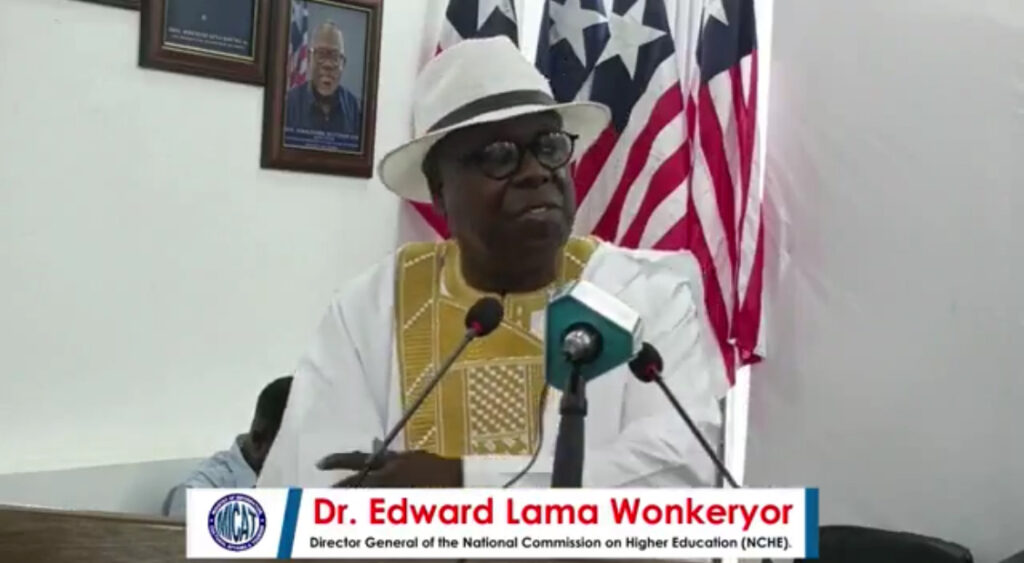By Jamesetta D Williams
In a bold move to reform Liberia’s higher education system, the National Commission on Higher Education (NCHE) has released findings from a nationwide quality assurance and compliance assessment that exposes major institutional failures across dozens of universities and colleges.
Speaking at the Ministry of Information, Cultural Affairs and Tourism (MICAT), the Director-General of NCHE, Dr. Edward Lama Wonkeryor, disclosed that several institutions were found to be operating under deplorable academic and administrative conditions, with some even running illegally without licenses.
“The majority of institutions assessed are operating under extremely challenged conditions, with widespread issues including unqualified staff, poor infrastructure, and violations of regulatory standards,” Dr. Wonkeryor said.
The NCHE-led inspection, launched in November 2024, aimed to examine institutional governance, curriculum standards, faculty qualifications, infrastructure, student support services, research engagement, and financial management across Liberia’s higher education landscape. The exercise involved NCHE’s senior management and external consultants.
According to Dr. Wonkeryor, the effort aligns with the ARREST Agenda of President Joseph Nyuma Boakai’s administration, which prioritizes reform, transparency, and system-wide accountability.
Based on the assessment, institutions were categorized into four groups:
Category A – Accredited and Chartered Institutions with Minor Challenges (32 Institutions)
These are recognized institutions that remain operational but have been directed to address specific shortcomings within a given timeframe.
University of Liberia
Cuttington University
African Bible College
Stella Maris Polytechnic University
Bomi County Community College, among others
Category B – Licensed and Accredited Institutions with Major Challenges (25 Institutions)
These institutions face severe operational or compliance issues such as lack of laboratories, qualified faculty, or proper governance. They are granted 1 month to 1 year to resolve these problems or risk suspension.
BlueCrest University College
George Johnson University College
United Methodist University
Wilberforce Baptist University
Forestry Training Institute, among others..
Category C – Institutions with Suspended Licenses (22 Institutions)
These schools have been suspended with immediate effect due to egregious violations or failure to meet basic operational standards.
Gloria Joy College of Science and Technology
Liberia Christian College
Messiah University College
Cypress International University
Evangel Christian University College.. among others
Dr. Wonkeryor warned that any institution found operating while under suspension will face prosecution, including arrests of administrators and fines.
Category D – Illegal Institutions Ordered Closed (21 Institutions Identified So Far)
A shocking number of unlicensed, illegal institutions were also discovered. Many were found offering degrees especially in health sciences without proper accreditation or facilities.
Merchu Institute of Health and Laboratory Sciences (72nd Junction)
Christ School System (Pipeline Road)
Open Bible College
College of Professional Studies (Jacob Town)
Royal Institute for Secretarial Science
GoNet Academy, among others..
“These schools are not only violating national laws, but they are putting students’ futures at risk,” Dr. Wonkeryor stated.
He added that inspections will continue, especially in underserved counties, and more closures are expected in the coming weeks.
The Commission has begun a separate review of graduate-level programs, including those at the University of Liberia. Dr. Wonkeryor emphasized that graduate teaching staff must hold terminal degrees (e.g., PhDs), and any programs failing to meet this criterion will be halted.
As a result, Trinity University’s graduate program has been suspended immediately, although its undergraduate programs are allowed to continue under supervision.
Dr. Wonkeryor used the opportunity to call for enhanced institutional support, revealing that NCHE itself is overwhelmed and in need of at least five to six PhD-level staff across disciplines to fulfill its growing mandate.
“We are committed to transforming Liberia’s education system to meet international standards,” he said. “But to do that, we must equip our regulatory institutions with qualified personnel and the resources to act.
The NCHE’s action sends a strong message: Liberia is entering a new era where higher education institutions must deliver quality or shut down. The government has made it clear that the days of unregulated degree mills are over.
“There will be no sacred cows,” Dr. Wonkeryor declared. “We are reforming the system to ensure Liberian students receive the education they deserve.
The comprehensive institutional report has been submitted to each affected school, with strict timelines for compliance. Meanwhile, NCHE pledges to uphold continuous monitoring and enforcement.


